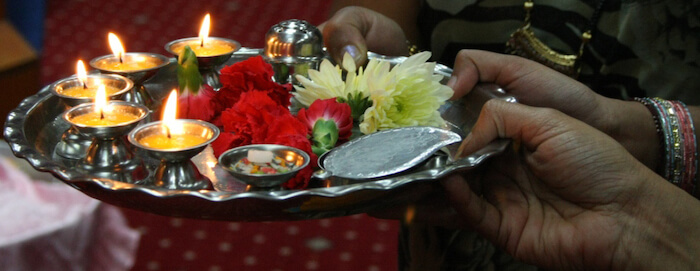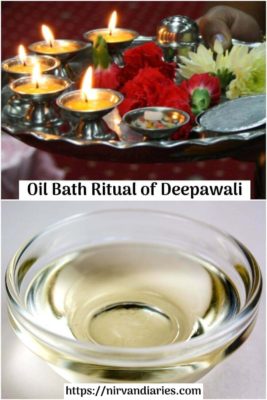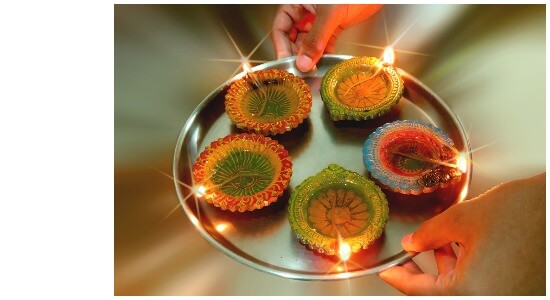In the southern region of India, the oil bath ritual is a part of many festivals, celebrations, and other religious rites. The oil bath ritual of Diwali has a special significance and charm. It is a tradition that has been handed over from generation to generation. What is the significance of the oil bath ritual of Deepavali? Why is it such an important and integral part of the Diwali festival?
Read on to know more about this endearing and enduring tradition, that exists in millions of households across Karnataka and other states of South India.
Oil Bath Ritual of Deepavali – A Deep-Rooted Tradition

The excitement of Deepavali rises to a feverish pitch on the day preceding the D-day. In Karnataka and other parts of South India, the most important of the festival days is Naraka Chaturdashi. The previous day is known as Neer Tumbo Habba, which literally means “water filling festival.” What this alludes to is the practice of keeping water ready in huge cauldrons heated by a fire lit with wooden logs.
These cauldrons used to be a standard feature in bathrooms, in the days gone by and were known as ‘Handes’. It was meticulously ensured that these tanks were full of water and ready to be used for the oil bath ritual for the entire family on the day of Naraka Chaturdashi. The ‘handes’ have become a rarity and been replaced by geysers, but the oil bath ritual of Deepavali endures.
Oil Bath Ritual of Deepavali – Religious Significance | Myths

The oil bath ritual is known as Abhyanga Snana in Karnataka and Maharashtra, and as Ganga Snanam in Tamil Nadu.
If you are from the south, you are sure to remember being woken up in the wee hours of the morning and being hustled into the bathroom for the Abhyanga Snana. The ritual of the holy bath on Naraka Chaturdashi leaves indelible memories in the mind.
The bath itself usually consists of massaging the entire body with warm castor oil, after applying a tika of Kumkum(vermilion), on the forehead. Turmeric too is applied to the forehead, hands and feet. After some time the oil is washed away with the help of a solution made of Shikakai powder.
Naraka Chaturdashi is believed to be the day on which Lord Krishna killed the demon Narakasura. The blood of the slain demon stained the body of the Lord and hence he took an oil bath to remove the stains. The oil bath ritual of Naraka Chaturdashi commemorates this event, which also marks the triumph of good over evil.
On a metaphysical level, the oil bath ritual also means a symbolic cleansing of evil thoughts and the beginning of a new life, filled with positivity, hope, and prosperity.
Oil Bath Ritual of Deepavali – Health Benefits
Apart from the religious, spiritual, and metaphysical significance of the oil bath ritual, there are many health benefits that are associated with the time-tested ritual.
The application of oil on the skin cleans and moisturizes it, dirt, pollutants, and toxins are also removed by massaging the oil. The massaging of the head with oil releases stress and calms the mind. The nerves are also simulated and blood circulation improves. The Abhyanga Snana or oil bath is an integral part of the ancient system of Ayurveda.
The body of one who does a regular Abhyanga does not get affected by accidents or strenuous physical work. A daily Abhyanga endows one with good skin, good physique and the body becomes strong, pleasant to look at, has good lustre and is not affected by old age – Charaka Samhita
The remarkable health benefits of Abhyanga Snana are mentioned in the ancient Ayurvedic texts like Sushruta Samhita, Charkha Samhita, and Ashtanga Hridayam. It is imperative to note that in the ancient texts, contraindications are also mentioned. The rich and esoteric knowledge of Ayurveda can be harnessed even today for a healthy body and mind. The ancient traditions and systems of India seamlessly integrated so many practices into our daily lives and festivals, that was meant for a better quality of life in all respects.
We hope you liked reading about the traditional festival routine of the oil bath in Deepavali and other festivals. Do comment with your thoughts. Please subscribe to our blog and follow us on our social media channels.
Happy Diwali!

Thanks for visiting our site nirvandiaries.com and taking the time to read this post.
If you wish to collaborate or work with us then reach us at [email protected]
We’d love it if you’d comment by sharing your thoughts on this post and share this post on social media and with your friends.
Follow our journey on our social media channels:
Facebook Twitter Instagram Pinterest






